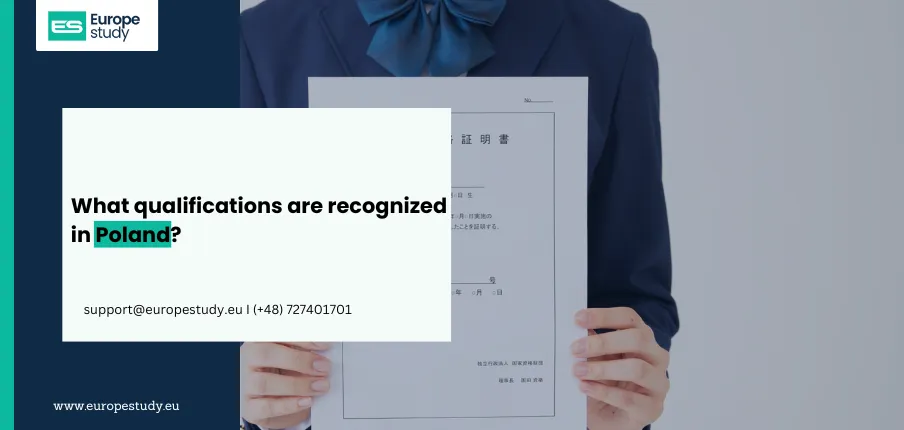
What Qualifications Are Recognized in Poland?
Poland is a member of the European Union and the European Higher Education Area, which makes it a country with a standardized and internationally recognized system of qualifications. Whether you’re a foreigner seeking to work or study in Poland, or a Polish citizen interested in how the system works, understanding what qualifications are recognized is essential.
This guide covers:
- The Polish Qualifications Framework
- Recognition of foreign qualifications
- Academic and professional recognition
- Vocational and technical qualifications
- How to get qualifications recognized
- Key institutions involved
The Polish Qualifications Framework (PQF)
Poland has adopted the Polish Qualifications Framework (Polska Rama Kwalifikacji, PRK), which is aligned with the European Qualifications Framework (EQF). The PQF consists of 8 levels, each corresponding to specific learning outcomes in terms of knowledge, skills, and social competence.
Here is a brief overview:
|
PRK Level |
Description |
Example Qualification |
|
Level 1 |
Basic general knowledge |
Lower secondary education |
|
Level 2 |
Basic vocational qualifications |
Vocational school diploma |
|
Level 3 |
More advanced vocational skills |
Journeyman’s certificate |
|
Level 4 |
Secondary education |
Matura (secondary school-leaving exam), Technician diploma |
|
Level 5 |
Short-cycle tertiary education |
Post-secondary diploma |
|
Level 6 |
Bachelor’s degree |
Licencjat, Inżynier |
|
Level 7 |
Master’s degree |
Magister, Magister Inżynier |
|
Level 8 |
Doctoral degree |
PhD (Doktor) |
This framework ensures transparency and comparability of qualifications both within Poland and across Europe.
Recognition of Foreign Qualifications
Recognition of foreign qualifications depends on what type of qualification you have and why you want it recognized (work, study, regulated profession).
Types of Recognition
- Academic Recognition
For studying in Poland or pursuing further education.- Handled by the National Agency for Academic Exchange (NAWA)
- Degrees from EU/EEA and OECD countries are often recognized automatically.
- Others may require a nostrification process by a Polish university.
- Professional Recognition
For working in regulated professions (medicine, law, engineering, etc.).- Handled by relevant professional bodies or ministries.
- EU citizens benefit from the Directive 2005/36/EC on the recognition of professional qualifications.
- Non-EU citizens must go through individual assessment.
- Vocational Recognition
For recognition of trade or technical qualifications.- Managed by the Institute for Educational Research (IBE) and Chambers of Crafts.
- May require passing a practical exam.
Academic Qualifications in Poland
School Education
- Primary Education (grades 1–8)
- Secondary Education:
- General secondary (liceum)
- Technical secondary (technikum)
- Basic vocational schools (branżowa szkoła I/II stopnia)
Students take the Matura exam at the end of secondary school, which qualifies them for higher education.
Higher Education
Poland uses a three-cycle system:
- First-cycle (Bachelor’s – Licencjat or Inżynier)
- Second-cycle (Master’s – Magister or Magister Inżynier)
- Third-cycle (Doctoral – Doktor)
There are also long-cycle programs (e.g., medicine, law, architecture) lasting 5-6 years, leading directly to a Master’s.
Degrees from accredited Polish universities are fully recognized across the EU and many other countries due to Poland’s adherence to the Bologna Process.
Regulated Professions
Certain professions in Poland are regulated by law, and to work in these, your qualifications must be formally recognized. Examples include:
- Doctor
- Nurse
- Dentist
- Pharmacist
- Architect
- Lawyer
- Teacher
- Civil engineer
Foreigners must apply to the relevant Ministry or Professional Chamber. This often involves:
- Degree translation
- Qualification comparison
- Language proficiency
- Possibly additional exams or internships
The EU Regulated Professions Database provides a list of all regulated professions in Poland.
Vocational and Technical Qualifications
Poland has a well-developed system of vocational education and training (VET).
Vocational qualifications are assessed by:
- Chambers of Crafts and Trades
- Sector Skills Councils
- Regional Examination Boards
Many vocational qualifications can be included in the Integrated Qualifications System (Zintegrowany System Kwalifikacji, ZSK) and listed in the Integrated Qualifications Register (ZRK), giving them formal recognition nationwide and across the EU.
How to Get Your Qualifications Recognized in Poland
Step-by-Step Guide
- Determine the type of qualification (academic, vocational, or professional).
- Contact the appropriate authority:
- NAWA for academic recognition
- Professional bodies or ministries for regulated professions
- IBE or Chambers of Crafts for vocational recognition
- Gather documentation:
- Diploma or certificate
- Transcript
- Learning outcomes or curriculum
- Certified translations (into Polish)
- Submit application:
- Pay applicable fees
- Await decision (usually several weeks to months)
- Additional steps if needed:
- Nostrification
- Bridging courses
- Language tests
- Practical exams
Key Institutions
- NAWA (Polish National Agency for Academic Exchange)
https://nawa.gov.pl - Ministry of Education and Science
https://www.gov.pl/web/edukacja-i-nauka - Institute for Educational Research (IBE)
https://ibe.edu.pl - Polish ENIC-NARIC Center (Academic recognition)
https://nawa.gov.pl/en/recognition - Chambers of Crafts and Professional Associations
Relevant to specific vocational or regulated professions
Conclusion
Understanding what qualifications are recognized in Poland is crucial for academic pursuits, employment, or professional licensing. Poland’s adherence to European standards, including the EQF and Bologna Process, means that most qualifications – especially from the EU/EEA and OECD countries – are easily recognized.
However, for certain fields, especially regulated professions, you may need to go through formal processes like nostrification, language verification, or practical exams. Being informed and contacting the appropriate authority early in your journey can save you significant time and effort.
If you're planning to work or study in Poland, make recognition your first step.





